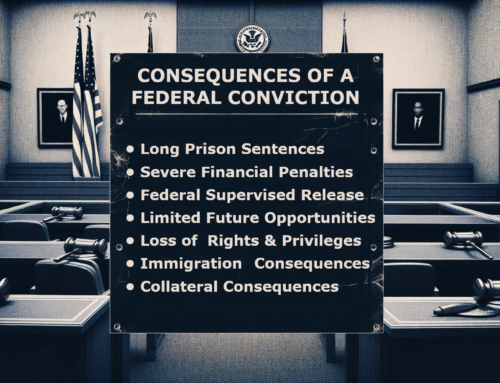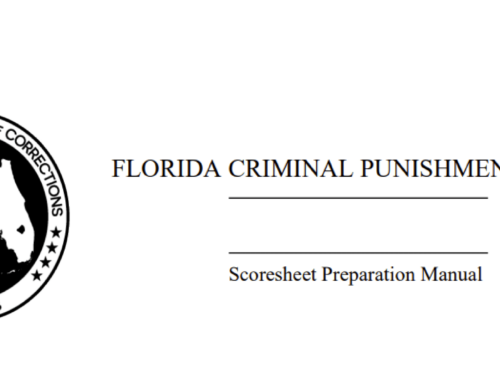Could Your Incarcerated Loved One Qualify for a Shorter Sentence under Amendment 821?
If you have a friend or family member currently in federal prison, you may have heard about a new amendment that could lower some inmates’ sentences. The most impactful changes coming into effect involve how a defendant’s criminal history is calculated under Amendment 821. This amendment limits the potential cumulative impact of “status points” that are added for committing a crime while under a criminal justice sentence like parole or probation. It also creates an avenue for certain first-time offenders with no prior record to receive reduced sentences. Here’s what you need to know about whether your incarcerated loved one could potentially qualify for relief under this change in sentencing laws.
What Does the Amendment Do?
On November 1, 2023, an amendment to the US Sentencing Guidelines went into effect, allowing for the retroactive reduction of sentences for some federal inmates. There are two main parts creating opportunities for sentence reductions:
Part A reduces the number of criminal history points given for committing a crime while under a “criminal justice sentence” from 2 points down to just 1 point.
Part B provides a 2-level decrease in the offense level for inmates with no prior criminal history as long as the crime didn’t involve violence, firearms, or other factors.
This amendment has potentially opened the door for thousands of inmates to have their sentences shortened through it. But you may be wondering, could my loved one be eligible? Here’s what you need to know about the criteria for relief under each part of the law.
Could Your Loved One Qualify Under Part A?
Part A helps inmates with 2 points added to their criminal history score under the old Section 4A1.1(d) for committing their offense while under probation, parole, supervised release, imprisonment, work release, or escape status.
Under Section 4A1.1(e), they would only get 1 point added instead of 2 for this “status.” So if your loved one received two status points at their original sentencing, Part A could move them into a lower criminal history category.
For example, if those 2 points had bumped them from Category II to Category III, removing 1 point would shift them back down to Category II and lower their final guideline range.
However, Part A only helps if the 1-point reduction actually drops the inmate into a lower criminal history category. Just having the status points doesn’t automatically qualify them. It depends on how the math works out.
Could Your Incarcerated Loved One Benefit Under Part B?
Part B assists inmates with zero criminal history points under Chapter 4, Part A at their original sentencing. If your loved one had no prior points, they may now qualify for a 2-level decrease in their overall offense level from Chapters 2-3.
But there are important exclusions. They won’t qualify for the 2-level reduction if their offense involved:
- Violence
- Firearms
- Terrorism
- Public corruption
- Serious drug trafficking
- Continuing criminal enterprise
- Career offender status
- Other excluded offenses
So, in order to benefit under Part B, your loved one needs to have had zero criminal history points AND not have any of the disqualifying factors above related to their crime.
If they meet both criteria, they could be eligible for the 2-level offense level decrease under this part of the amendment.
Other Key Facts if Your Loved One May Qualify
If it looks like your incarcerated family member or friend might be eligible for relief under Part A or Part B, here are some other important things to understand:
- The court will assess each case individually to decide if a lower sentence is appropriate, considering factors like public safety. A reduction isn’t guaranteed even if they qualify.
- The reduction typically can’t take their sentence below the amended guideline minimum. There are exceptions for departures below the minimum for substantial assistance.
- They have to file a motion for the court to consider reducing the sentence. It won’t happen automatically.
- Any motion for reduction can’t be filed until February 1, 2024, at the earliest. So they’ll have to wait until at least that date, even if they qualify.
As you can see, while this amendment could allow sentence reductions for some inmates, there are strict criteria to meet. If you think your incarcerated loved one may qualify under Part A or Part B, it’s important to have an attorney review their case. A lawyer can determine if pursuing relief through this new law could benefit them.
Don’t rely on unofficial prison talk about eligibility – get expert legal advice tailored to their situation. With a lawyer’s help, your loved one may find they qualify for a shortened stay under this recent change. Take action now to evaluate their options – this could mean less time apart for your family.
Get a Free Consultation for Your Loved One
If you have an incarcerated family member or friend who may qualify for a reduced federal sentence, we can help. We have decades of experience achieving results for clients involved in the criminal justice system. Let’s explore options for your loved one under this important new amendment.
CALL US NOW for a CONFIDENTIAL INITIAL CONSULTATION at (305) 538-4545, or take a moment to fill out our confidential and secure intake form.* The additional details you provide will greatly assist us in responding to your inquiry.









